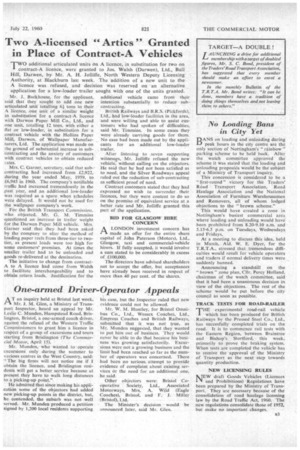Two A-licensed " Artics " Granted in Place of Contract-A Vehicles
Page 37

If you've noticed an error in this article please click here to report it so we can fix it.
TWO additional articulated units on A licence, in substitution for two on
contract-A licence, were granted to Jos. Walsh (Darwen), Ltd., Bull Hill, Darwen, by Mr. A. H. Jolliffe, North Western Deputy Licensing Authority, at Blackburn last week. The addition of a new unit to the A licence was refused, and decision was reserved on an alternative application for a low-loader trailer sought with one of the units granted.
Mr. J. Backhouse, for the applicant, said that they sought to add one new articulated unit totalling 61 tons to their A licence, one unit of a similar weight in substitution for a contract-A licence with Darwen Paper Mill Co., Ltd., and one unit, totalling 12 tons, with either a flat or low-loader, in substitution for a contract vehicle with the Hollins Paper Mill, Darwen, of Wallpaper Manufacturers, Ltd. The application was made on the ground of substantial increase in subcontracting and the anxiety of customers with contract vehicles to obtain reduced rates.
Mrs. C. Garner. secretary, said that sub-, contracting had increased from £2.922, during the year ended May, 1959, to £6,945 in 1960. The company's notifiable traffic had increased tremendously in the past year, and an additional low-loader was required as a spare when schedules were delayed. it would not be used for the wallpaper company's work.
For the British Transport Commission. who objected, Mr. G. M. Timmins questioned an increase in trailer weight for the Darwen Paper Mill vehicle. Mrs. Garner said that they had been asked by the company to alter the method of loading paper reels from three-tier to twotier, as present loads were too high for some customers' premises. At times the smaller trailer had to be unloaded and goods re-delivered at the destination.
The initiative to change from con tractA to A licence had come from Walsh to facilitate interchangeability and to obtain return loads. Justification for the
additional vehicle came from their intention substantially to reduce subcontracting.
British Railways and B.R.S. (Pickfords), Ltd, had low-loader facilities in the area, and were willing and able to assist customers who had spoken of difficulties, said Mr. Timmins. In some cases they were already carrying goods for them. No case had been made out by the applicants for an additional low-loader trailer.
After listening to seven supporting witnesses, Mr. Jolliffe refused the new vehicle, without calling on the objectors. He said that he had not been satisfied as to need, and the Silver Roadways appeal ruled out the reduction of sub-contracting as sufficient proof of need.
Contract customers stated that they had expressed no wish to surrender their licences, but they were content to do so on the promise of equivalent service at a better rate and Mr. Jolliffe granted this part of the application.
BID FOR GLASGOW HIRE CONCERN
AA LONDON investment concern has made an offer for the entire share capital of John Paterson (Motors), Ltd., Glasgow, taxi and commercial-vehicle hirers. If fully accepted, it would involve a sum stated to be considerably in excess of £100,000.
The directors have advised shareholders not to accept the offer, but acceptances have already been received in respect of more than 40 per cent. of the shares.




































































































